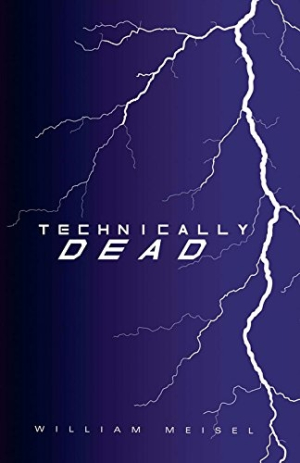Technically Dead
Meisel’s absorbing work keeps pages turning and minds churning, and his ability to combine the technological with the personal makes him an author to watch.
William Meisel’s intriguing, technologically sound thriller, Technically Dead, is a slightly futuristic murder mystery with artificial intelligence in the background.
Archibald “Archie” Teal, a socially awkward, brilliant computer scientist, consults for the Los Angeles Police Department, especially in cases assigned to the attractive but tough Detective Nikki Sharp. With the aid of Archie’s highly developed virtual assistant, Erasmus, the duo has been able to solve some extremely tough cases. Thanks to Archie’s advanced technical skills and his ability to dig into the virtual universe along with Nicki’s classic gumshoe skills, they make a formidable team.
The story takes two paths, the first being the murder investigation of Edward Hoskins, the enigmatic leader of tech company Involvement.com; the second is the evolving relationship between Archie and Nikki. As the pair closes in on the murderer, they also draw closer together, and the relationship Archie’s been hoping for seems to be within his reach.
The author clearly knows the world of technology. Refreshingly, his writing style is clear enough that even the more technologically oriented elements of the story are accessible. The author’s use of Erasmus as a means for exposition is an adept choice; the computerized voice of Archie’s virtual assistant giving the backstory serves as a means to communicate the large amount of information the author wants to impart. The technological bits provided by Erasmus serve to make the work realistic for the genre, but not so tech-focused as to take away from the story’s more compelling aspects. The additional element of the budding relationship between Archie and Nikki, and Nikki’s ability to serve as a translator of social norms to Archie in the same way that he translates the world of computing to her, is notable.
One small problem area is the balance of action and exposition within the text. While the use of Erasmus for much of the exposition is a wonderful fit, there are still some points at which the old adage “show, don’t tell” comes to mind.
Overall, this is an exciting and enjoyable novel with well-drawn characters and an interesting and fast-paced plot. The author’s portrayal of Archie, with all of his faults and foibles, as such a vulnerable man leads to a true feeling of compassion for one who could have instead been looked at as a caricature of the stereotypical computer geek. The same could be said of Nikki, drawn as a tough female cop, yet still willing to give of herself to the somewhat odd Archie.
This book will be an especially good fit for lovers of mysteries with a technological bent. Meisel’s absorbing work will keep pages turning and minds churning, and his ability to combine the technological with the personal makes him an author to watch.
Reviewed by
Tracy Fischer
Disclosure: This article is not an endorsement, but a review. The publisher of this book provided free copies of the book and paid a small fee to have their book reviewed by a professional reviewer. Foreword Reviews and Clarion Reviews make no guarantee that the publisher will receive a positive review. Foreword Magazine, Inc. is disclosing this in accordance with the Federal Trade Commission’s 16 CFR, Part 255.

